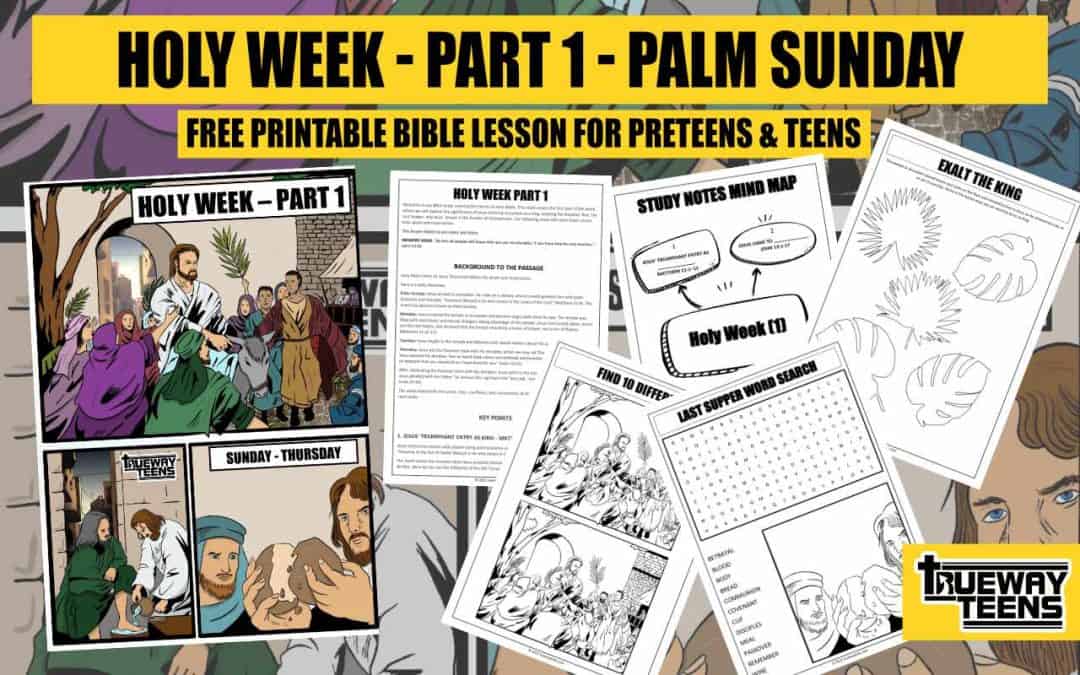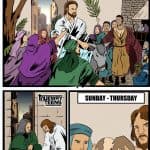Welcome to our Bible study covering the events of Holy Week. This study covers the first part of the week, where we will explore the significance of Jesus entering Jerusalem as a king, washing the disciples’ feet, the Last Supper, and Jesus’ prayer in the Garden of Gethsemane. Our following study will cover Jesus’ arrest, trial, death and resurrection.
This lesson relates to pre-teens and teens.
MEMORY VERSE: “By this all people will know that you are my disciples, if you have love for one another.” John 13:35
DOWNLOAD THE FREE PRINTABLE LESSON

BIBLE STUDY NOTES FOR TEENS
Holy Week refers to Jesus’ final week before His death and resurrection.
Here is a daily Overview:
Palm Sunday: Jesus arrived in Jerusalem. He rode on a donkey where crowds greeted Him with palm branches and shouted, “Hosanna! Blessed is he who comes in the name of the Lord” (Matthew 21:9). This event has become known as Palm Sunday.
Monday: Jesus entered the temple in Jerusalem and became angry with what He saw. The temple was filled with merchants and money changers taking advantage of the people. Jesus overturned tables, drove out the merchants, and declared that the temple should be a house of prayer, not a den of thieves (Matthew 21:12-17).
Tuesday: Jesus taught in the temple and debated with Jewish leaders about His authority.
Thursday: Jesus ate the Passover meal with His disciples, which we now call The Last Supper. On this night, Jesus washed His disciples’ feet to teach them about servanthood and humility. Jesus said, “I have set you an example that you should do as I have done for you” (John 13:15).
After celebrating the Passover meal with His disciples, Jesus went to the Garden of Gethsemane to pray. Jesus pleaded with His Father “to remove this cup from Him” but said, “not My will but Yours be done” (Luke 22:42).
The week ended with the arrest, trial, crucifixion, and resurrection of Jesus, which we will explore in the next study.
KEY POINTS
1. JESUS’ TRIUMPHANT ENTRY AS KING – MATTHEW 21:1–11
Jesus entered Jerusalem with people laying palm branches and cloaks in front of Him and shouting, “Hosanna to the Son of David! Blessed is He who comes in the name of the Lord!” (Matthew 21:9).
The event marks the moment when Jesus presents Himself as King. A King who is humble and rides on a donkey. Here we can see the fulfilment of the Old Testament prophecy in Zechariah 9:9, which says, “Behold, your king is coming to you; righteous and having salvation is he, humble and mounted on a donkey…”
In biblical times, kings or rulers arrived riding on a donkey to represent their peaceful intent rather than riding a horse to signalize war.
In John 12:13, we read, ‘So they took branches of palm trees and went out to meet him, crying out, “Hosanna! Blessed is he who comes in the name of the Lord, even the King of Israel.”
Though the people were looking for an earthly king, God had something far greater in store. Jesus’ triumphal entry was a sign that He was the Messiah, the Son of God and King of Kings. Jesus is still the King of Kings, and His Kingdom is eternal.
2. JESUS CAME TO SERVE – JOHN 13:1-17
The night before He died, Jesus showed His love for His disciples by washing their feet. Jesus set an example for us to love and serve one another. In Matthew 20:28, Jesus says, “the Son of Man came not to be served but to serve”.
Serving others looks different for each of us. Maybe it involves volunteering at church or in the community, helping with chores around the house, or offering encouragement to someone who needs it. However, you choose to serve, it’s important to remember that even small acts of service can make a big difference.
We should follow Jesus’ example by putting the needs of others before our own and serving them in any way we can. By doing so, we show others the love of Jesus.
The Bible says a lot about serving others. Galatians 5:13 says, “serve one another in love.” Jesus also said in Matthew 25:40, “Whatever you do for the least of these brothers and sisters of mine, you are doing for Me.”
3. JESUS FULFILLED THE PASSOVER – MATTHEW 26:17-30
The Last Supper was Jesus’ last meal with His disciples before He was arrested. During this meal, Jesus used the elements of the Passover celebration to show that He was the fulfilment of the Passover and to introduce a new way for us to remember Him.
The Passover celebration was when the Jewish people remembered their deliverance from slavery in Egypt. A lamb was sacrificed, and its blood was spread on the doorposts of the homes, symbolizing the protection from death for those who believed. The Passover foreshadowed the coming of the Lamb of God, who would take away the world’s sin.
When Jesus introduced the Lord’s Supper, He declared that the bread spoke of his body, which would be broken. The wine spoke of His blood, indicating the death He would soon experience.
As we remember Jesus’ sacrifice through the Lord’s Supper, we are reminded of the New Covenant. Jesus, the Passover Lamb, was sacrificed, and His death brings forgiveness and redemption to all who believe. We are told to remember Him and proclaim this truth until He returns (1 Corinthians 11:26).
4. JESUS FOLLOWED THE WILL OF HIS FATHER – LUKE 22:42
Jesus came to earth with a purpose, to do the will of His Father. He lived with this mission in mind, always seeking to glorify His Father and fulfil His will. One of the clearest examples of this in Jesus’ life was while He prayed in the Garden of Gethsemane, “not My will, but Yours be done” (Luke 22:42).
This prayer shows us the depth of Jesus’ obedience and humility. He was facing the cross, yet He was willing to submit to the will of his Father.
As followers of Jesus, we, too, are called to submit to the will of our Heavenly Father. We are to seek His will in all things and be willing to lay aside our desires and plans to fulfil His purposes. This can be a difficult path to follow, but as we trust in God and submit to His will, we find that His plans for us are always good and bring true joy and fulfilment.
Romans 12:2 says, “Do not conform to the pattern of this world but be transformed by the renewing of your mind. Then you will be able to test and approve what God’s will is—His good, pleasing and perfect will.”
Let us pray for the strength and wisdom to submit to the will of our Father, just as Jesus did. May we trust in His goodness and be willing to lay aside our own desires, knowing that His plans for us are always perfect.
CONCLUSION The events of the Holy Week are a powerful reminder of Jesus’ love and sacrifice. Jesus fulfilled the Old Testament prophecies, lived a perfect life, and set a perfect example for us to follow.
Free printable Teen Worksheets in the lesson pack
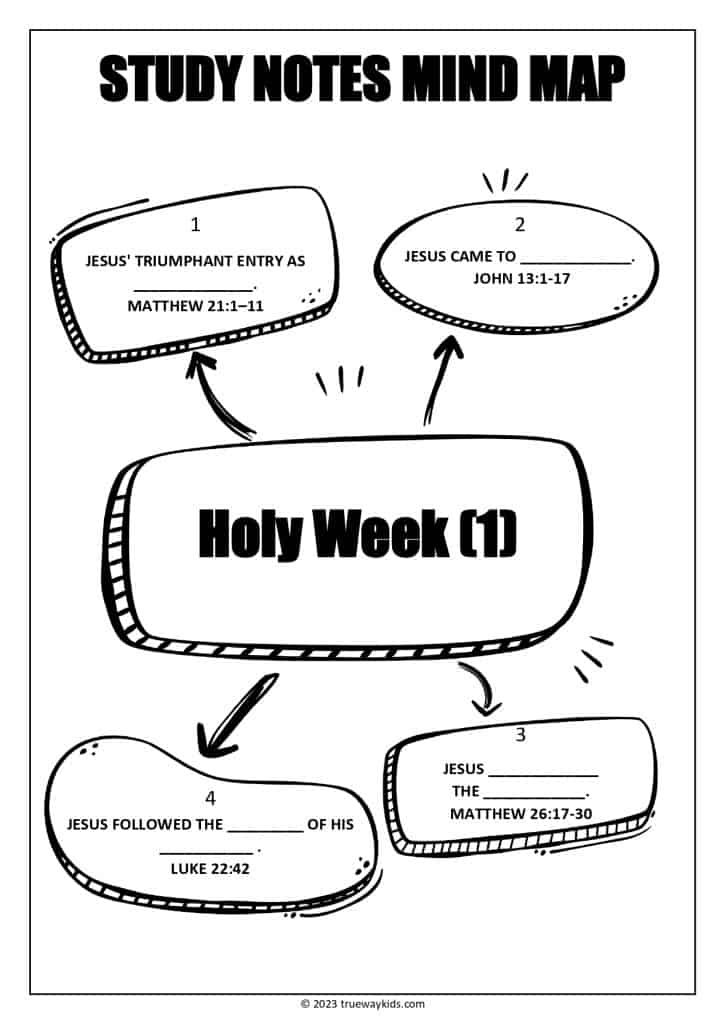
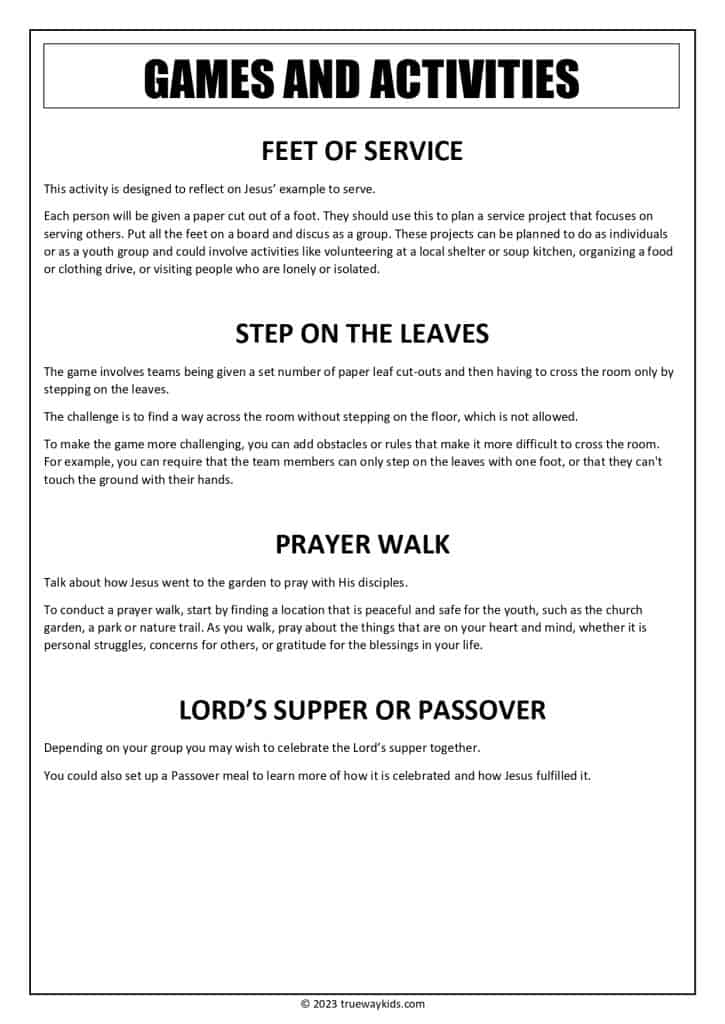
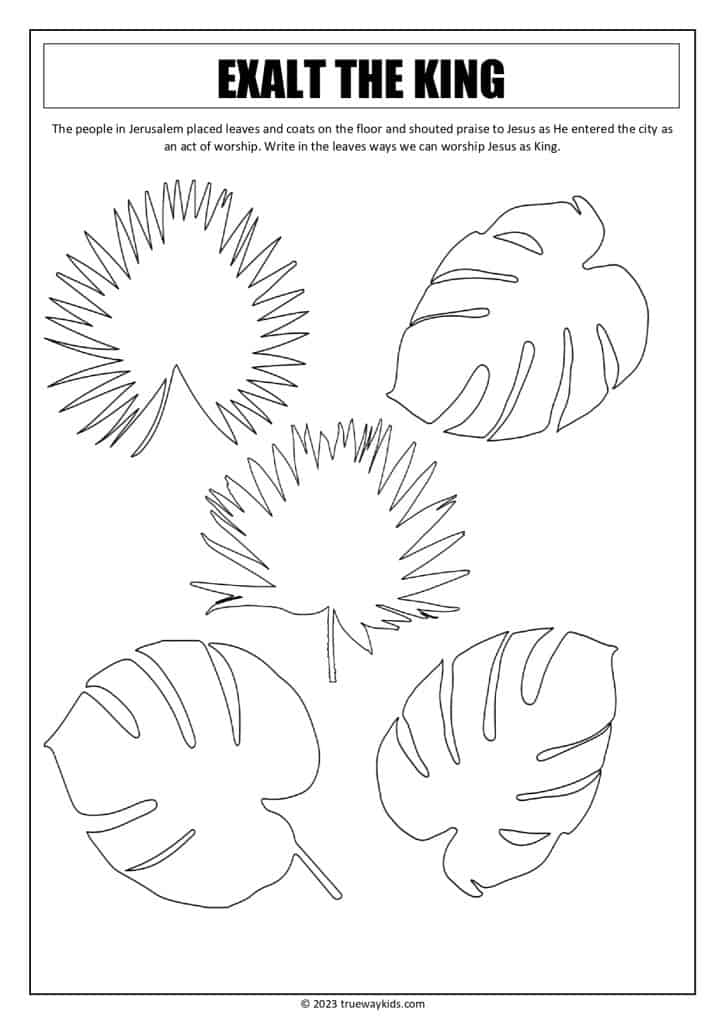
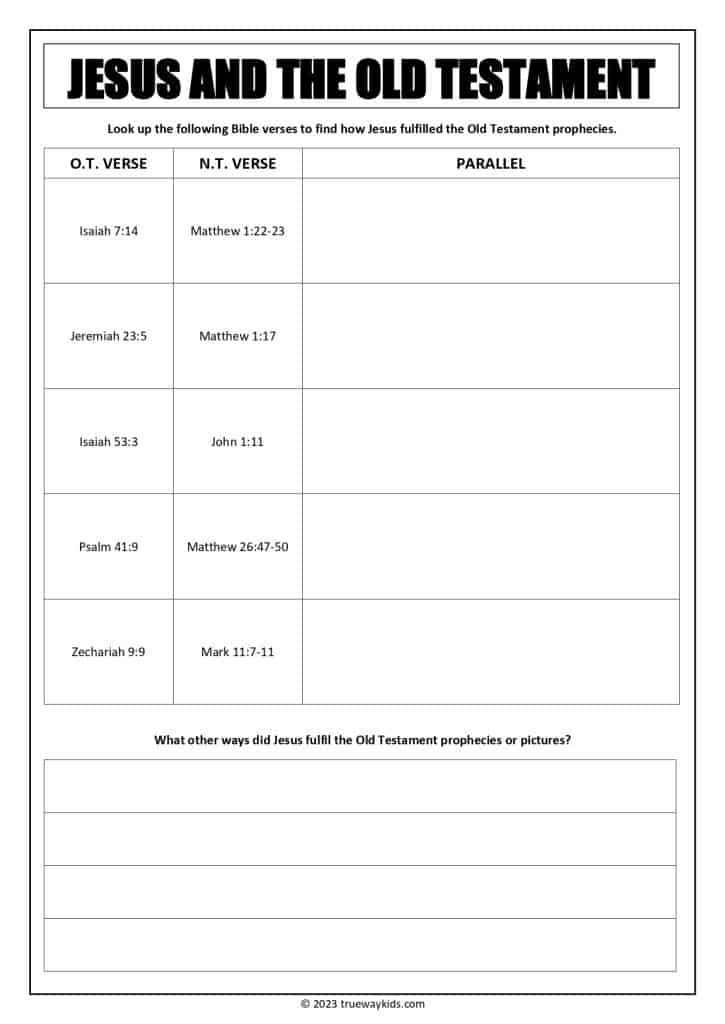
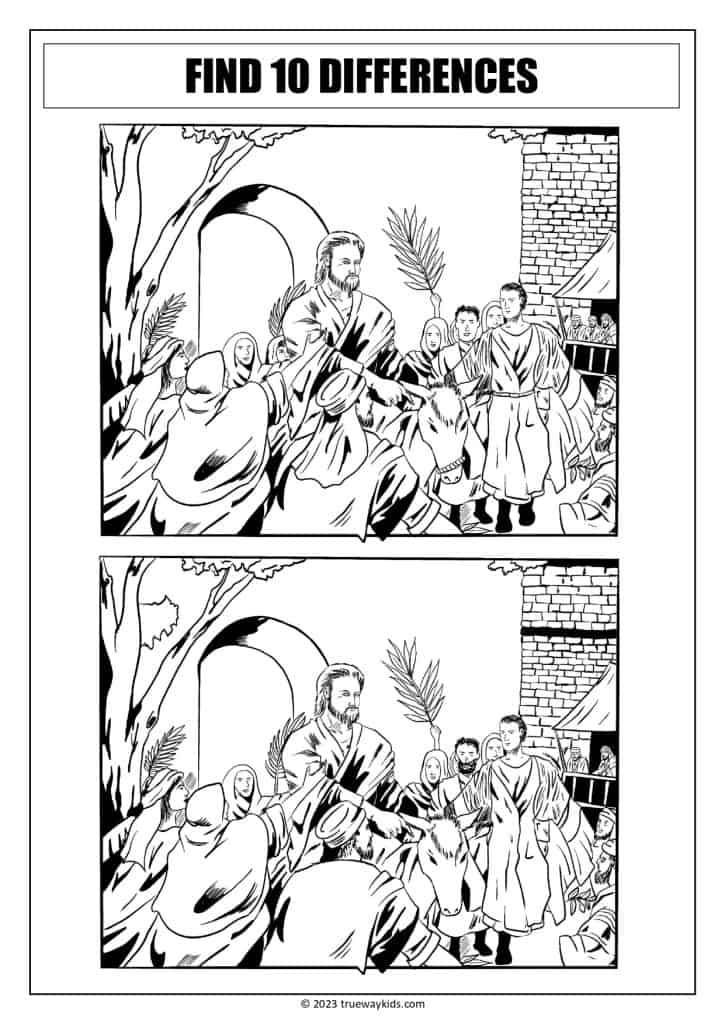
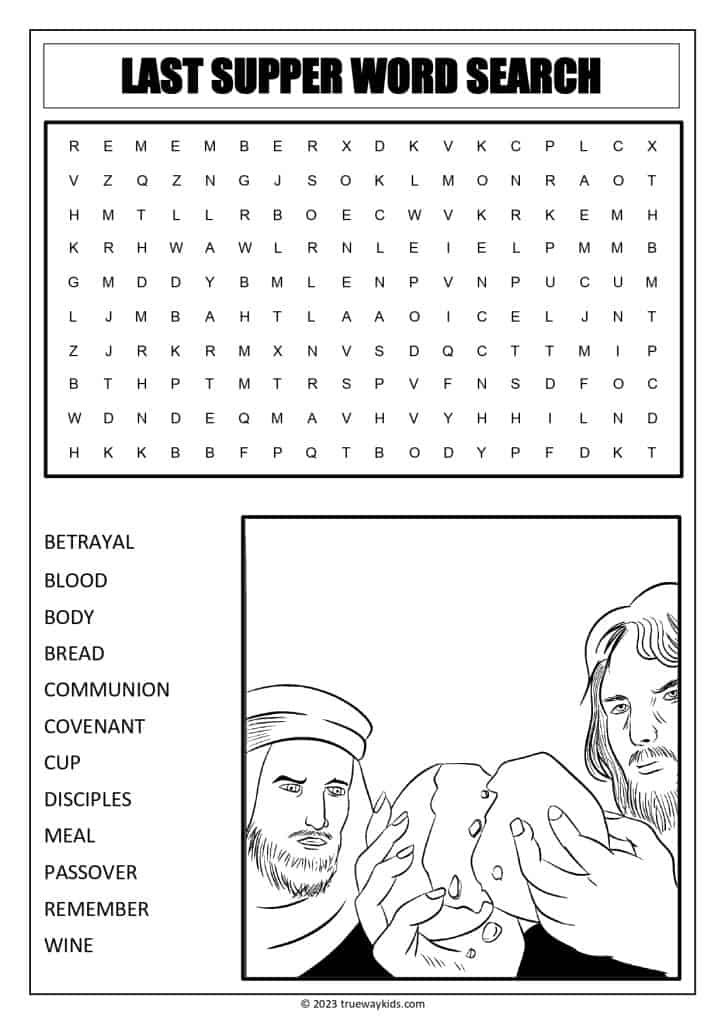
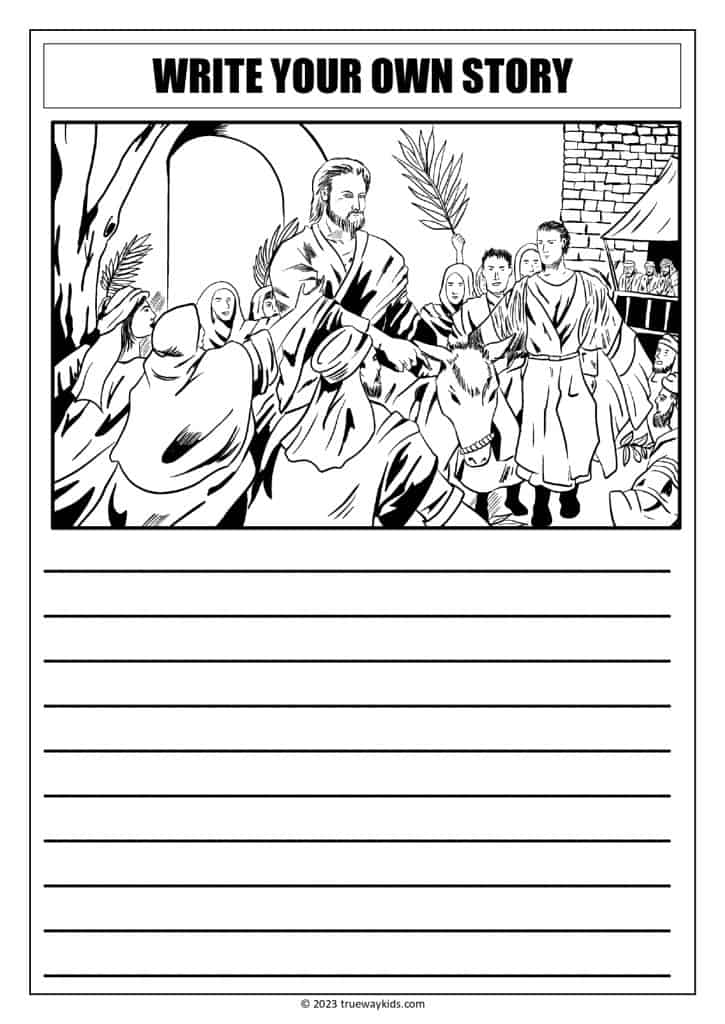
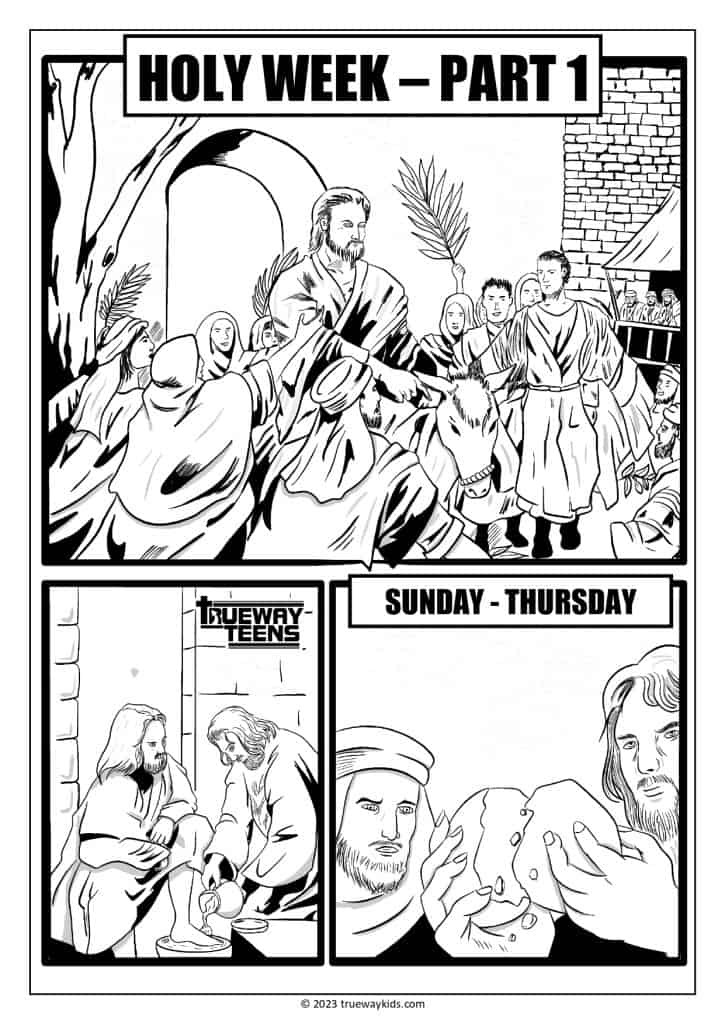
DOWNLOAD THE FREE PRINTABLE LESSON

Translations
View our other Easter Resources here including story trail. other age groups, crafts and much more.

